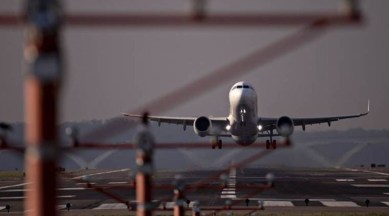Another hike in ATF price, airfares set to rise
Jet fuel prices are revised on the 1st and 16th of every month, based on the average international price of benchmark fuel in the preceding fortnight.

IN THE 10th hike since the beginning of the year, state-owned oil marketing companies revised the price of aviation turbine fuel (ATF) by 16.3%, taking the cost of jet fuel in Delhi to a record high of Rs 1,41,232.87 per kilolitre. The rising jet fuel prices, combined with depreciating rupee, is set to increase the cost of operations for airlines, leading to an increase in airfares by up to 15%.
Aviation industry experts have pointed out that fuel cost is already at unsustainable levels and airlines have no option but to pass it on in the form of fare hikes. SpiceJet chairman Ajay Singh, in a statement, said they will have to pass on the increase in ATF prices to fliers, and that will lead to an increase in fares by up to 15%.
monthly limit of free stories.
with an Express account.
Jet fuel prices are revised on the 1st and 16th of every month, based on the average international price of benchmark fuel in the preceding fortnight.
The cost of ATF comprises up to 50% of the cost of operations for airlines in India. Airlines are already struggling with the fall in the value of the domestic currency (rupee is 5.7% weaker against the US$ since June 2021) since costs like lease rentals, payments to foreign airport operators and expat pilots are all dollar denominated.
“Aviation turbine fuel prices have increased by more than 120% since June 2021. This massive increase is not sustainable and governments, central and state, need to take urgent action to reduce taxes on ATF that are amongst the highest in the world. We have, in the last few months, tried to absorb as much burden of this fuel price rise as we could,” SpiceJet’s Singh said.
Newsletter | Click to get the day’s best explainers in your inbox
Jet fuel prices have been increased by state-owned oil marketing companies every fortnight since the beginning of 2022, and in 10 hikes starting January 1, ATF prices have been increased by Rs 67,210.46 per kilolitre. “The sharp increase in jet fuel prices and the depreciation of the rupee have left domestic airlines with little choice but to immediately raise fares and we believe that a minimum 10-15% increase in fares is required to ensure that cost of operations is better sustained,” Singh added.
Even as the summer travel season was expected to generate high demand, sustained fuel price increase and high fares have tempered this demand. “The forward bookings are not looking very good. We expected that by this time, we’d be well past the pre-Covid numbers, but the general sentiment has not been in favour of air travel mainly because of high fares, especially in the last month or so,” said a senior executive of a low-cost airline.
Travel industry insiders say fares are already about 50% higher than last year and a further increase will impact that demand. Any increase in fares impacts passenger demand since people opt for cheaper modes of travel like trains and roadways.
Notably, domestic airfares are still governed by government-mandated price ceilings and floors.
The airline industry had sought respite through a cut in excise duty on ATF or by bringing jet fuel under GST, that will bring down rates as well as allow airlines to claim input credit tax on GST paid. While bringing it under GST seems unlikely for now, the aviation ministry had asked the finance ministry to reduce excise duty on jet fuel by 2 percentage points to 9 per cent. The finance ministry, however, did not cut any taxes on ATF.